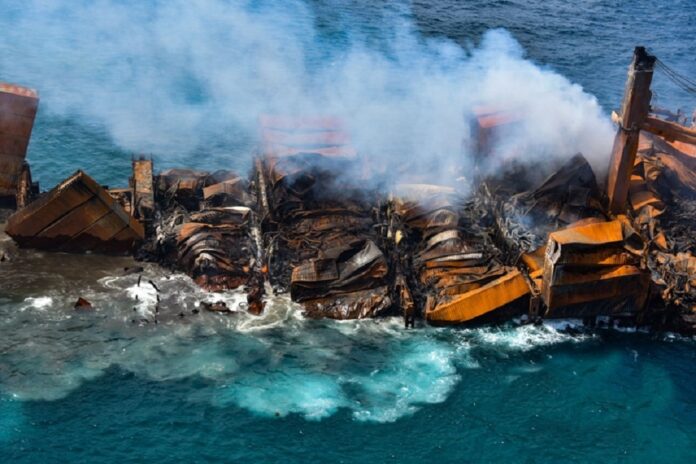More than a year since the sinking of the cargo ship the X-Press Pearl in the island nations territorial waters, Sri Lanka is still grappling to claim compensation of US$ 7 billion from the ship owners which was brought down to $ 4 billion due unknown reasons amidst the delay in finalizing relevant documents and proceed with the case.
An expert committee investigating the extent of damage to the country’s marine and coastal environment has now concluded the disaster to be the worst in terms of chemical and plastic pollution of the sea.
That’s according to Ajith de Alwis, co-chair of the X-Press Pearl damage assessment committee and a professor of chemical and process engineering at the University of Moratuwa.
The committee has submitted its assessment report to the Attorney General’s Office for use in claiming compensation from the Singapore-based operators of the ship.
The State Minister said some 11,061 fisher families from Gampaha District, 3050 families from Colombo and 701 families from Kalutara were affected by the tragedy. “Some 4888 fishermen have lost their livelihood as a result of the disaster,” he revealed.
“Some 1726 metric tons of rubble pellets from the ship have been collected till this date, while arrangements have been made to salvage ship from the sea. The company which owns the ship has given this task to a foreign company.
Also the Minister revealed that former state Minister Nalaka Godahewa and the then Secretary of Ministry of Foreign Affairs Jayanath Kolambage should take the responsibilty of their failure to take prompt action to claim compensations damages caused to Sri Lanka following ship disasters of New Diamond and X-Press Pearl with in the past two years.
X-Press Pearl was carrying 1,486 containers when it caught fire off Colombo on May 20, 2021, and began sinking.
Eighty-one of the containers were labeled hazardous, and the cargo included 25 metric tons of nitric acid — a key ingredient in the production of explosives, and touted as a possible factor for the fire.
There were several explosions, and it took more than a week to bring the fire under control. Attempts to tow the vessel to deeper waters failed, and the freighter finally sank on June 2, 2021, a few kilometers off Sri Lanka’s western coast.
The ship was also carrying 400 containers of nurdles, the plastic pellets from which all manufactured plastic goods are made.
The spill of the more than 50 billion pellets made this the worst plastic marine pollution event in the world, with the pellets quickly spreading along the beaches of Sri Lanka’s western coast.
In the aftermath of the ship accident, marine biologists noted an unusually high number of sea turtle mortalities, which they suspect was the result of the pollution, but for which they currently lack definitive evidence.
